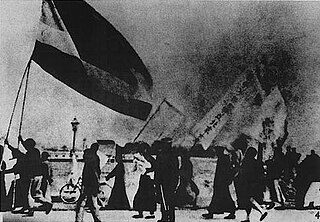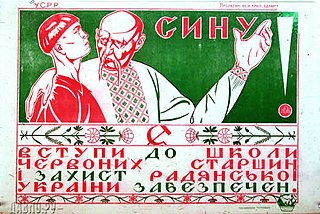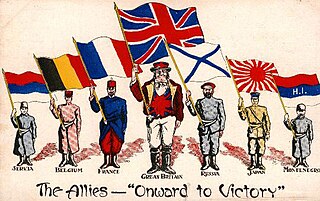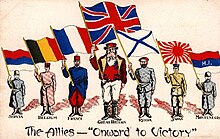
Irredentism is one state's desire to annex the territory of another state. This desire can be motivated by ethnic reasons because the population of the territory is ethnically similar to the population of the parent state. Historical reasons may also be responsible, i.e., that the territory previously formed part of the parent state. However, difficulties in applying the concept to concrete cases have given rise to academic debates about its precise definition. Disagreements concern whether either or both ethnic and historical reasons have to be present and whether non-state actors can also engage in irredentism. A further dispute is whether attempts to absorb a full neighboring state are also included. There are various types of irredentism. For typical forms of irredentism, the parent state already exists before the territorial conflict with a neighboring state arises. However, there are also forms of irredentism in which the parent state is newly created by uniting an ethnic group spread across several countries. Another distinction concerns whether the country to which the disputed territory currently belongs is a regular state, a former colony, or a collapsed state.

A nation-state is a political unit where the state, a centralized political organization ruling over a population within a territory, and the nation, a community based on a common identity, are congruent. It is a more precise concept than "country", since a country does not need to have a predominant national or ethnic group.
Nationalism is an idea and movement that holds that the Nation should be congruent with the state. As a movement, it presupposes the existence and tends to promote the interests of a particular nation, especially with the aim of gaining and maintaining its sovereignty (self-governance) over its perceived homeland to create a nation-state. It holds that each nation should govern itself, free from outside interference (self-determination), that a nation is a natural and ideal basis for a polity, and that the nation is the only rightful source of political power. It further aims to build and maintain a single national identity, based on a combination of shared social characteristics such as culture, ethnicity, geographic location, language, politics, religion, traditions and belief in a shared singular history, and to promote national unity or solidarity. Nationalism, therefore, seeks to preserve and foster a nation's traditional culture. There are various definitions of a "nation", which leads to different types of nationalism. The two main divergent forms identified by scholars are ethnic nationalism and civic nationalism.
A nation is a large type of social organization where a collective identity, a national identity, has emerged from a combination of shared features across a given population, such as language, history, ethnicity, culture, territory or society. Some nations are constructed around ethnicity while others are bound by political constitutions.

Chinese nationalism is a form of nationalism in which asserts that the Chinese people are a nation and promotes the cultural and national unity of all Chinese people. According to Sun Yat-sen's philosophy in the Three Principles of the People, Chinese nationalism is evaluated as multi-ethnic nationalism, which should be distinguished from Han nationalism or local ethnic nationalism.
The term "minority group" has different usages, depending on the context. According to its common usage, the term minority group can simply be understood in terms of demographic sizes within a population: i.e. a group in society with the least number of individuals, or less than half, is a "minority". Usually a minority group is disempowered relative to the majority, and that characteristic lends itself to different applications of the term minority.

Korenizatsiia was an early policy of the Soviet Union for the integration of non-Russian nationalities into the governments of their specific Soviet republics. In the 1920s, the policy promoted representatives of the titular nation, and their national minorities, into the lower administrative levels of the local government, bureaucracy, and nomenklatura of their Soviet republics. The main idea of the korenizatsiia was to grow communist cadres for every nationality. In Russian, the term korenizatsiya (коренизация) derives from korennoye naseleniye. The policy practically ended in the mid-1930s with the deportations of various nationalities.
An ethnocracy is a type of political structure in which the state apparatus is controlled by a dominant ethnic group to further its interests, power, dominance, and resources. Ethnocratic regimes in the modern era typically display a 'thin' democratic façade covering a more profound ethnic structure, in which ethnicity – and not citizenship – is the key to securing power and resources.
Internal colonialism is the uneven effects of economic development on a regional basis, otherwise known as "uneven development" as a result of the exploitation of minority groups within a wider society which leads to political and economic inequalities between regions within a state. This is held to be similar to the relationship between a metropole and a colony, in colonialism proper. The phenomenon leads to the distinct separation of the dominant core from the periphery in an empire.

National identity is a person's identity or sense of belonging to one or more states or one or more nations. It is the sense of "a nation as a cohesive whole, as represented by distinctive traditions, culture, and language". National identity may refer to the subjective feeling one shares with a group of people about a nation, regardless of one's legal citizenship status. National identity is viewed in psychological terms as "an awareness of difference", a "feeling and recognition of 'we' and 'they'". National identity also includes the general population and diaspora of multi-ethnic states and societies that have a shared sense of common identity identical to that of a nation while being made up of several component ethnic groups. Hyphenated ethnicities are examples of the confluence of multiple ethnic and national identities within a single person or entity.
A stateless nation is an ethnic group or nation that does not possess its own sovereign state. Use of the term implies that the nation has the right to self-determination, to establish an independent nation-state with its own government. Members of stateless nations may be citizens of the country in which they live, or they may be denied citizenship by that country. Stateless nations are usually not represented in international sports or in international organisations such as the United Nations. Nations without a state are classified as fourth-world nations. Some stateless nations have a history of statehood, while some were always stateless.
Anthony David Stephen Smith was a British historical sociologist who, at the time of his death, was Professor Emeritus of Nationalism and Ethnicity at the London School of Economics. He is considered one of the founders of the interdisciplinary field of nationalism studies.
Civic nationalism, otherwise known as democratic nationalism, is a form of nationalism that adheres to traditional liberal values of freedom, tolerance, equality, and individual rights, and is not based on ethnocentrism. Civic nationalists often defend the value of national identity by saying that individuals need it as a partial shared aspect of their identity in order to lead meaningful, autonomous lives and that democratic polities need a national identity to function properly. Liberal nationalism is used in the same sense as 'civic nationalism', but liberal ethnic nationalism also exists, and "state nationalism" is a branch of civic nationalism, but it can also be illiberal.

Banal nationalism refers to everyday representations of a nation, which build a sense of shared national identity.
Among scholars of nationalism, a number of types of nationalism have been presented. Nationalism may manifest itself as part of official state ideology or as a popular non-state movement and may be expressed along civic, ethnic, language, religious or ideological lines. These self-definitions of the nation are used to classify types of nationalism, but such categories are not mutually exclusive and many nationalist movements combine some or all of these elements to varying degrees. Nationalist movements can also be classified by other criteria, such as scale and location.
John Hutchinson is a British academic. He is a reader in nationalism at the London School of Economics (LSE), in the Department of Government.
Territorial nationalism describes a form of nationalism based on the belief that all inhabitants of a particular territory should share a common national identity, regardless of their ethnic, linguistic, religious, cultural and other differences. Depending on the political or administrative status of a particular territory, territorial nationalism can be manifested on two basic levels, as territorial nationalism of distinctive sovereign states, or territorial nationalism of distinctive sub-sovereign regions.
Ethnic nationalism, also known as ethnonationalism, is a form of nationalism wherein the nation and nationality are defined in terms of ethnicity, with emphasis on an ethnocentric approach to various political issues related to national affirmation of a particular ethnic group.
Harris Mylonas is Associate Professor of Political Science and International Affairs at George Washington University and the editor-in-chief for Nationalities Papers, a peer-reviewed academic journal published by Cambridge University Press. He is the author of The Politics of Nation-Building: Making Co-Nationals, Refugees, and Minorities, which was awarded the Peter Katzenstein Book Prize in September 2013 and the 2014 European Studies Book Award by the Council for European Studies. He has co-authored Varieties of Nationalism: Communities, Narratives, Identities. and has co-edited Enemies Within: The Global Politics of Fifth Columns as well as The Microfoundations of Diaspora Politics. He is currently working on another book project, Diaspora Management Logics. His documentary Searching for Andreas: Political Leadership in Times of Crisis (2018), which deals with the deep causes of the recent financial and political crisis in Greece, premiered at the 2018 Thessaloniki Documentary Festival and won two awards at the 2019 International Documentary Festival of Ierapetra.
Andreas Wimmer is a Swiss sociologist who is the Lieber Professor of Sociology and Political Philosophy at Columbia University. He has a PhD in social anthropology from the University of Zurich.






